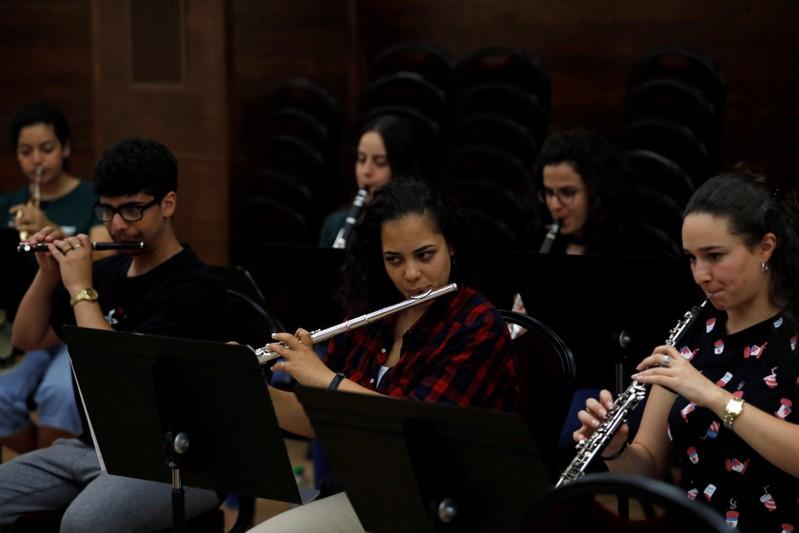
JERUSALEM (Reuters) – Most international musicians would baulk at the notion of a two-day journey to final rehearsals past military checkpoints on alert for weapons smugglers – but for 19-year-old viola player Ibrahim Masri it’s an occupational hazard.
He’s part of the Palestine Youth Orchestra, which has been touring Europe for three weeks and whose 76 members – crossing borders and religious divides – include Muslims, Druze and Christians.
They say they cannot gather the full orchestra at home because Israeli restrictions make it too hard to bring together members from Gaza, the West Bank, Jerusalem and refugees abroad.
“We can play but it is hard to travel,” said Ibrahim, who had to travel two days from Nablus in the West Bank through neighboring Jordan to reach Oslo, where the tour convened.
“When we go to (the West Bank’s) Birzeit or to Ramallah we pass through checkpoints. And especially when you have your musical instrument and get searched, you get asked ‘What is this, why is this with you?’” he told Reuters TV.
“It’s always a hassle when you move from one town to another in order to meet.”
Israel says its West Bank security measures are to protect its citizens against attacks from suicide bombers and gunmen, which peaked in the Palestinian uprisings of the late 1980s and early 2000s.
Israel has also imposed a blockade on Gaza, whose Islamist militant rulers Hamas refuse to recognize Israel and have fought three wars with it in the past decade.
With a program combining traditional classical and Arabic music, the orchestra played dates in Norway, Sweden, Denmark, Germany and the Netherlands.
“They’re always the best trips of my life. We get very close to each other, and we share unforgettable experiences,” said cellist Jude Qalawi as she boarded a bus in Jerusalem at the start of the tour.
She and her compatriots earned standing ovations at the finale in Amsterdam’s palatial Concertgebouw, the home venue of PYO conductor Vincent de Kort.
He became involved with the orchestra after playing a concert in Jordan in 2017. “I think the music speaks for itself,” he said. “The message is beauty… is understanding. And music is the best language to do that because everyone in the world loves music.”
Aged 14 to 27, its players on this tour came from Jerusalem, the Israeli-occupied West Bank, and inside Israel itself. There were also Palestinian musicians from Jordan, Syria and Lebanon, and some non-Palestinians.
However, unlike on previous tours, nobody from Gaza made this trip, orchestra manager Zeina Khoury said.
An easier journey was had by Mostafa Saad, the 21-year-old concert master and lead violinist, whose two brothers and sister also play with the orchestra.
None of the Saad brothers did army duty, despite coming from Israel’s Druze Arab community, whose men usually serve in the Israeli military.
“Once you play with your friends in Palestine you can never imagine yourself holding a rifle instead of your instrument,” he said.
Writing by Stephen Farrell; editing by John Stonestreet




